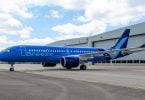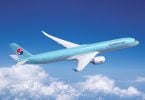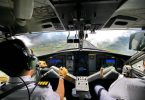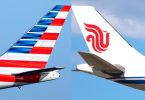Thai Airways International has begun to exploit relatively untapped freight operations in earnest, with a plan to deploy up to eight dedicated freighters to create a cargo business entity in its own right.
THAI, which has been largely a passenger airline throughout its 50-year history, aspires to become a major Asian freight operator in the same league as Korean Air, of which major revenue comes from the air cargo business.
Over the next decade, the Thai flag carrier aims to operate a fleet of eight freighters including the Boeing B747F and smaller regional freighters, according to Pichai Chunganuwad, managing director of the Cargo and Mail Commercial Department.
In the near term, THAI is looking to acquire a medium-haul freighter, with a payload of 40-50 tonnes, such as Airbus A300-600 or Boeing 767 to operate on regional routes.
That cargo plane, expected to enter service at THAI early next year, will support the long-haul freight forwarding capacity rendered by two Boeing 777-200 LRF freighters operated by the Connecticut-based low-cost cargo carrier Southern Air and on which THAI has a space purchase agreement.
The so-called block space agreement, which became effective last March for a two-year period, ushered in a new era for THAI’s air cargo business, allowing the company to meet longer-distance bulk shipment requirements outside its current network.
Mr Pichai said the regional freighter would especially enable THAI to cash in on the fast-growing air cargo haulage needs in China and India through Bangkok.
Using the B777-200 LRF jet, the world’s largest twin-engine freighter, on regional routes is not economical due to its long-range economy of scale.
Putting in place sufficient capacities with dedicated planes is essential if THAI wants to turn Suvarnabhumi Airport into a cargo hub as the capacity in the bellies of passenger planes has its limitations, he pointed out.
THAI plans to ramp up the cargo frequencies on routes now operated by the B777-200 LRFs, by adding a third weekly flight on Bangkok-Frankfurt non-stop, a second weekly service on Bangkok-Hong Kong-Amsterdam while introducing a once-a-week flight on Bangkok-Delhi-Amsterdam, to cater to increasing demand.
THAI’s overall air cargo business fared relatively well in the first eight months of this year, with a 62% capacity utilisation, up from 56% last year, said Mr Pichai.
The airline handles 60,000 tonnes of cargo a month, expected to rise to 65,000 to 70,000 tonnes in the last quarter in line with seasonal increase in demand.
The outlook for growth looks good with projected revenue of 26 billion baht for the whole of 2010, compared to 21.3 billion baht last year.
But Mr Pichai cautioned that the global freight rates are being depressed by the increase in capacity pushed up by the recommissioning of a good number freighters which were left idle during the economic downturn last year.
In another move to make the cargo operation an entity in its own right, THAI’s cargo unit on Jan 1 will be restructured to become a “profit centre”, with its financial accounts being made independent from the flag carrier’s main balance sheet.






















